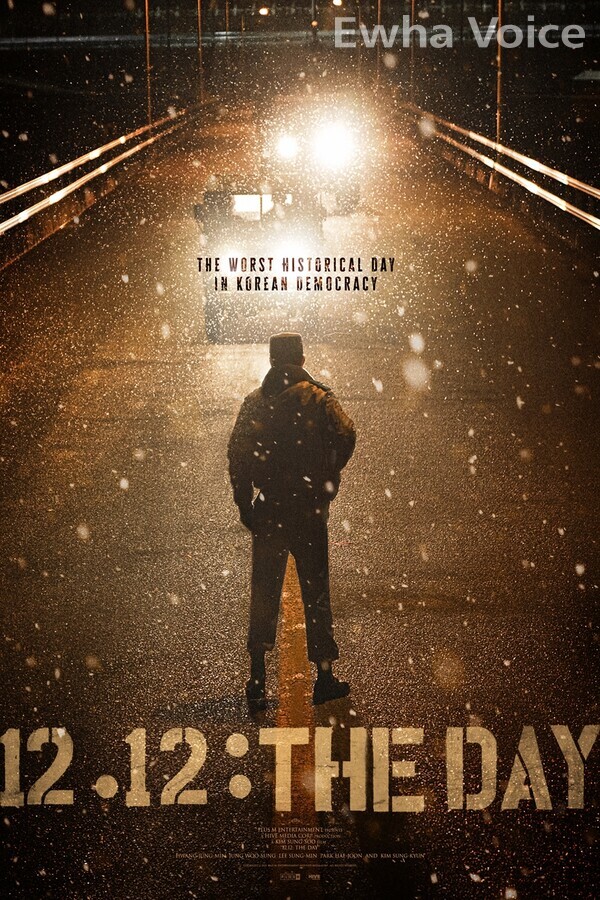
In 1979, the South Korean government fell to a military coup d’état that was carried out by former President Chun Doo-Hwan, who was a South Korean soldier at that time. The coup was successful with Chun seizing power as a dictator, leading to one of South Korea’s darkest moments in history.
“12.12: The Day” is a Korean historical film released on Nov. 22, 2023, that revolves around the background leading up to the 12.12 Military Insurrection. Becoming the sixth highest-grossing movie in the history of Korea box office, the political movie gained a cross-generational popularity for its modern storytelling infused with action sequences.
Award-winning Korean actor Hwang Jung-min featured in the film as the role of Chun and received praise for his accurate and captivating portrayal of Chun in both resemblance and acting. Jung Woo-sung participated as Capital Defense Commander Lee TaeShin who is modeled after Jang Taewan, an opposing figure to Chun that fought vigorously for justice. Soldiers whose lives were taken during the coup d’état such as Kim Oh-rang, who goes by Oh Jin-ho in the film and is played by trending actor Jung Hae-in, left a lasting impression as well. As a side note, the names of the characters in the film and their real-life counterparts are not reminiscent and are deviated.
Though it is a historical film that we all know the ending to, it gives constant goosebumps at every turn of the plot throughout the entire running time. Before delving into the plot, here is a heads-up for spoiler alerts.
The film starts with the assassination of President Park Chung-hee after which Chun uses the disarray at the government to plot his overthrow, growing political forces in an unofficial military organization called Hanahoe, or “Group of One.” Meanwhile, Lee Tae-Shin is appointed as the Commander of the Capital Garrison Command, a position that protects Seoul from other military units and one that many desire including Chun himself.
As such, Lee and Chun are faced in a conflict with Chun’s thirst for political power threatening the well-being of Lee. On the fateful day of Dec. 12, 1979, Chun and Hanahoe, the rebel troupes, initiate military operation “Birthday Home Party” where they kidnap Jeong Seung-hwa, ROK Army Chief of Staff who was in a higher post than Chun and had not sided with him, to prevent any command hindering their military coup. Following the kidnapping, they invade downtown Seoul with tanks of the second Special Forces Group striking the capital. In an effort to stop the rebels, Lee gathers those who had not yet turned to Chun to cut off the invasion at the Han River, standing in front of the tanks while screaming, “Stop advancing or I’ll give shoot-to-kill orders,” but fails to stop the tanks. Eventually, the plot follows along the flow of history and ends with the rebel’s victory.
The literal title of “12.12: The Day” is “Spring of Seoul.” Why was it called so? For one, the term “Spring of Seoul” represents the numerous democratization and protests that occurred after the military dictatorship of Chun until May 16, 1980. Korean citizens, especially university students, protested under the united voice for democracy. The sweet bloom of democracy seemed to be impending and people were hopeful for a new beginning after the cold winter of dictatorship.
However, spring had to wait for more than a decade due to the enforcement of martial law that extended to the whole nation which launched the shutdown of universities, curtailing of media freedom and forceful military intervention in any protests against the government. In the process, innocent lives were taken in events such as the Gwangju Uprising.
Spring may not have arrived in “12.12: The Day,” but due to the efforts of historical figures such as Lee TaeShin (Jang Tae-wan) who tried to hold his stance against Chun and the collective protests by brave Korean citizens at that time, it is spring in South Korea today.

